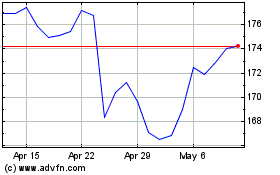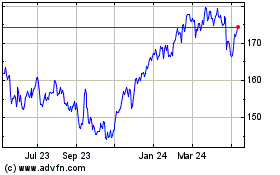By Paul Vieira
OTTAWA -- Canada's economy is facing a blow from two weeks of
protests that have blocked multiple railway lines, stranding
shipments and snarling supply chains in key commercial
corridors.
In the latest fallout from the blockades, the country's largest
passenger-rail operator Wednesday issued temporary layoff notices
for 1,000 workers, a day after Canadian National Railway Co. said
it would temporarily lay off 450 workers of its own. Factories in
central Canada could be next in sending workers home, said the head
of a national lobby for manufacturers and exporters.
Economists said the stoppages threaten to shave 0.1% to 0.3%
from economic output in February, adding the damage could be
greater the longer the interruption drags on.
Protests obstructing rail lines in central Canada started Feb.
6, after police began enforcing a court order to remove people who
were trying to prevent construction of a natural-gas pipeline in
British Columbia. A group of indigenous leaders oppose the pipeline
because of environmental concerns.
While one blockade has been resolved in British Columbia, others
show no signs of dissipating in the important corridors of eastern
Canada. Companies are either forced to deal with goods they can't
ship to customers, or struggling to secure the parts and components
required to produce their wares.
Businesses fortunate enough to secure a truck to ship are paying
premium rates. Some, like CKF Inc., a maker of packaging for food
products, have decided to eat the increased costs for now to keep
customers satisfied. A logistics broker said freight rates for
trucks have climbed as much as 20% since protests began.
The blockades "have caused some supply-chain chaos in our
company," said Ian Anderson, president of family-owned CKF, which
employs 800 people and makes everything from disposable plates to
packages for eggs. "We will have to see how big this gets and how
long this lasts, and what the consequences are."
Canadian National said it was forced to shut down its eastern
Canadian network to ensure the safety of its employees and of the
protesters. The main blockage -- near the town of Belleville in the
eastern province of Ontario -- has cut off goods coming by freight
rail from the eastern Canadian ports in Montreal and Halifax, Nova
Scotia, to central Canada, and vice versa.
"This situation is regrettable for its impact on the economy and
on our railroaders as these protests are unrelated to CN's
activities, and beyond our control," the company said. Canadian
National handles more than 250 billion Canadian dollars ($189
billion) of goods annually.
Via Rail Canada, the government-owned passenger-rail service,
said that in addition to its temporary layoff notices, it has
suspended nearly 600 trains since the blockades began, affecting an
estimated 111,000 passengers. Some service hit by the blockades is
expected to resume Thursday.
"We have done everything to mitigate the impact on our employees
and our passengers," said Cynthia Garneau, Via Rail's chief
executive.
Canadian Prime Minister Justin Trudeau said Wednesday the
layoffs were "unacceptable," and his Liberal government was "doing
everything we can to resolve this peacefully and quickly."
Canadian National has obtained court orders to have the
protesters removed. Mr. Trudeau, however, said "elevating the
temperature and going in forcefully is not going to solve this"
because it could trigger a new round of protests.
Dennis Darby, president of the Canadian Manufacturers and
Exporters, said his group's estimate is that up to C$450 million of
goods a day are being left stranded because of the freight-rail
interruption. Three-quarters of Canada's manufacturing capacity is
in eastern Canada.
"This has gone from serious to critical," Mr. Darby said.
"Manufacturers are suffering losses in terms of product that's
perishable. And companies have told us they are going to start
cutting shifts at plants. The ripple effect will be in the
factories."
Todd Karran, chief executive of Nova Chemicals Corp., said the
petrochemicals maker has yet to scale back production levels, and
has found a temporary workaround by changing routes and using
trucks.
"This is definitely more costly," said Mr. Karran, whose company
has annual sales of $4 billion.
He said the risk of lost sales to customers in eastern Canada is
mounting unless a resolution is in sight. "If we can't get our
products on rail, we are going to lose to competitors in the
U.S."
Canada's economy was expected to rebound in early 2020 after a
weak fourth quarter -- weighed down in part by an eight-day labor
strike at Canadian National, along with softness in exports and
business investment. Data next week is expected to show Canadian
output more or less stalled to end 2019, with the Bank of Canada
forecasting a meager annualized advance of 0.3% in the final three
months.
Derek Holt, economist at Bank of Nova Scotia, said the blockades
represent a "shock to the system" because companies weren't
prepared for the disruption.
"The economy has been a subpar performer compared to its peers
like the U.S. for multiple quarters," Mr. Holt said. "These
economic microbursts only compound the growth risks."
Write to Paul Vieira at paul.vieira@wsj.com
(END) Dow Jones Newswires
February 20, 2020 09:13 ET (14:13 GMT)
Copyright (c) 2020 Dow Jones & Company, Inc.
Canadian National Railway (TSX:CNR)
Historical Stock Chart
From Aug 2024 to Sep 2024

Canadian National Railway (TSX:CNR)
Historical Stock Chart
From Sep 2023 to Sep 2024
